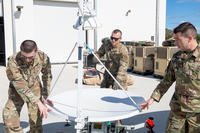The U.S. Navy has awarded its Next Generation Enterprise Network, or NGEN, contract of up to $3.4 billion to Hewlett Packard Co. to upgrade and run the service's communications network – a backbone connecting as many as 800,000 users.
The Hewlett Packard team won over a group of companies including Computer Sciences Corp. The five-year NGEN deal was designed to lower prices through competition among the seven vendors who bid for the deal and engender a circumstance wherein the network is able to accommodate technological advances as they emerge, according to Sean Stackley, assistant secretary of the Navy for acquisition, research and development.
“What we want to do is be in an environment where the flexibility of the contract allows the system, the NGEN system, to evolve as technology and requirements evolve and not be stuck inside of a five year window and have to wait until the end of the contract to figure out what comes next,” Stackley told reporters June 27.
Hewlett Packard will lead a team of subcontractors and perform work at as many as 2,500 Navy and Marine Corps locations around the globe to include major bases and single-user sites, service officials explained.
The announcement cites a $321 million initial one-year award to HP as part of an indefinite-delivery/indefinite-quantity, or IDIQ, arrangement which includes four one-year options that may bring the cumulative value of the deal up over $3 billion. If all options are exercised, work on the deal will continue through 2018, according to a Navy statement.
The deal will help the Navy keep pace with fast-moving technological changes in the world of IT, officials said.
“Because of the innovation and the flexibility we brought into this contract, we believe we’ll have a much greater opportunity to transition to the newer and latest technologies that are out there in the IT space at cost,” said Victor Gavin, program executive officer of enterprise information systems.
“Additionally we believe we’ve postured ourselves because of this change to be more aligned with the new and emerging security requirements that will be coming along.”
Gavin said he sees the network migrating toward more of a cloud-based architecture for the future, as a way to lower costs and improve network security.
“We believe that not only the Navy network but that industry in general is going to a more cloud-based architecture because of a lot of reasons -- cost as well as security," he said. "We believe this contract allows us from a technology standpoint to move in that direction. The pace at which we do that, however, is going to be driven by our pace of dealing with our government applications."







